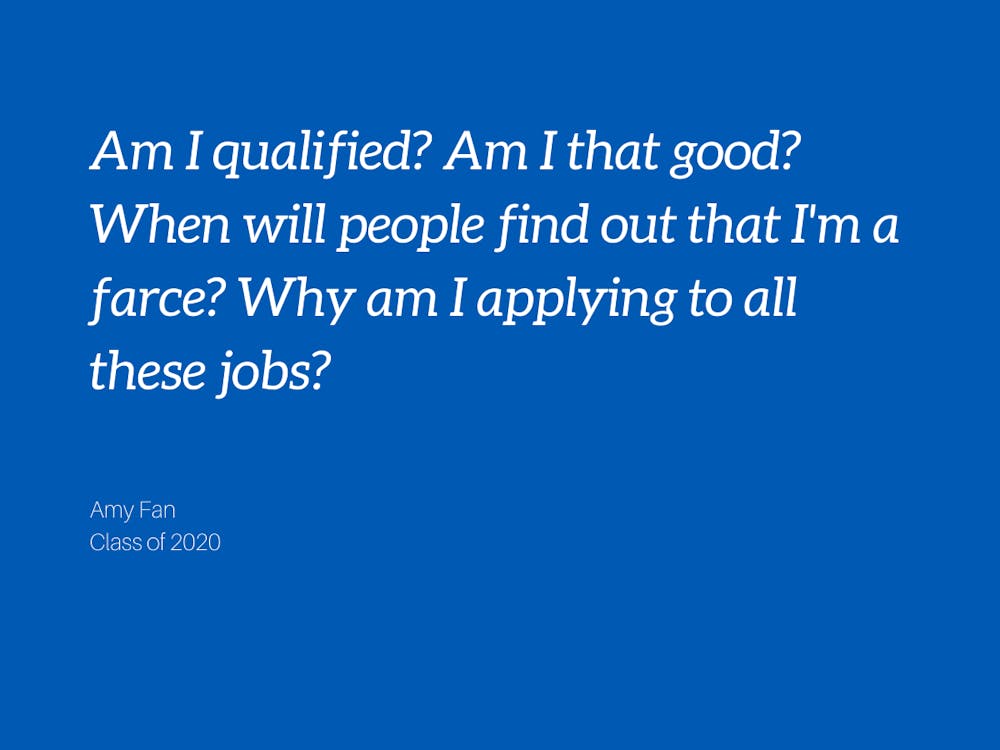My junior fall, I spent many weekend nights with my roommate working on internship applications. In our double facing main quad, we'd sit at our desks or curled up in bed, typing away at our computers, editing cover letters and resumes, filling out applications, doing coding challenges, recording video interviews, emailing recruiters, preparing for interviews, updating our internship spreadsheets—all the things that made up “recruitment.”
There were a lot of benefits to going through this process with a friend. We'd share resources, ask, "does this sound impressive?” about specific language on our resumes, read email drafts aloud to each other, question how to navigate the foreign network of LinkedIn (Why does my resume need to be visible to the world? Why are people posting their internship offers? Should I change my privacy settings? Maybe I should just get off LinkedIn?). We’d commiserate about the vagueness of job descriptions (Am I really exceptionally detail-oriented and organized?), give each other pep talks, trying to bring some human emotion into what otherwise felt like a cold and uncaring process.
But what’s stuck with me the most is the time we spent on conversations.
Am I qualified? Am I that good? When will people find out that I'm a farce? Why am I applying to all these jobs? Why are people going to judge me so much based off of where I work? What if I don't live up to "their" expectations? How much time could I save by not worrying about this?
I'm not sure when we started talking about the confidence of a mediocre white male, but we weren't the first to use the phrase. The internet seems to agree that it first showed up in a tweet by the Canadian writer Sarah Hagi back in 2015. Etsy has a whole slew of mugs, shirts, tote bags, buttons, cross-stich patterns, and stickers that say: "Carry yourself with the confidence of a mediocre white man."
The confidence gap is well-documented, with terms like “imposter syndrome” and the need to “lean in.” One study found that men would apply to a job if they felt like they met 50% of the listed qualifications, while women wouldn't apply unless they met 90% of the qualifications. Professionally, women “choose” to go into less competitive fields. Men consistently overestimate their abilities relative to women.
Part of me used to and still does live in awe of that confidence. I wonder what it’s like to move through spaces without questioning your assumptions, without having to wonder whether your voice is interesting or relevant. Sometimes I want to know what it’s like to be less qualified and more confident. I worry about how these kinds of day to day interactions will bleed into my post-grad life, both in my personal interactions and in the professional world.
At the same time, every time I hear an extra voice because I decided to keep my mouth shut, every difficult experience I can speak to and give advice on because I've experienced some variety of it myself, it feels worth it to not subscribe to those norms of confidence. Because of course, confidence is the product of so many other societal factors. Every seminar class where I didn't speak up and didn’t feel like I needed to be heard, every networking opportunity I skipped or botched, every time someone's made me question whether I belonged in a space, every time I got (probably unconsciously) interrupted, every time I felt like I wasn't being taken seriously, every email where I go back and recalibrate the number of exclamation points to convey the right balance between seriousness and friendliness, every weird glance I've gotten when I take up "too much" space, whatever makes me feel like I have to make my points concise and be insightful witty and thoughtful all in one breath. Sometimes I’m pretty sure it wasn’t sure if it was all just in my head.
And after all, this is Duke, and we all got here in part by playing the system remarkably well. Perhaps it's not productive to spend so much time dwelling on confidence, or lack thereof. All the effort put towards having confidence took away from answering very real questions, like: How do I balance the very real need to have summer plans with wait, do I actually want to do this? Had pre-professionalism seeped so far into my life that my roommate couldn’t just be my friend on a Friday night rather than my informal career coach?
Sometimes, on those weekend nights, when the pep talks were just too many words, when the concern was there but the emotional energy wasn't, I probably spat out the words "MEDIOCRE WHITE MALE" at her, as a shorter version of:
Just apply to the position. You're probably not going to get it, but that's not a reason not to do it. There's someone out there more confident and less qualified than you who's throwing their name into the hat with much less concern. The world is going to work this way. It's not fair. We've given each other all the reassurances like "You're not the one to make the judgement. Don’t reject yourself before they reject you." There's enough rejection that happens on this campus professionally, academically, socially—that sometimes there just needs to be an acknowledgement that it happens. I hear you. Just apply to the position.
But of course, that's much easier said than done.
Amy Fan is a Trinity senior. Her column, “fangirling,” typically runs on alternate Thursdays.
Get The Chronicle straight to your inbox
Signup for our weekly newsletter. Cancel at any time.

Amy Fan is a Trinity senior. Her column, "fangirling," runs on alternate Thursdays.

